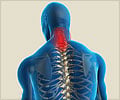Scientists have discovered a gene which may help explain why some people are more sensitive to and less able to tolerate pain.
Scientists have discovered a gene which may help explain why some people are more sensitive to and less able to tolerate pain.
Dr Geoffrey Woods, of Cambridge University, said that discovery of a gene responsible for pain could greatly increase the ability to conquer and control it."The search for effective analgesics (pain releaving drugs) with acceptable side effects has long been the goal of doctors and biomedical researchers," he said.
"Because current therapies have limited efficacy (effectiveness), with up to 50 per cent of treated subjects receiving inadequate pain relief, there exists a significant need to develop better therapies."
In a study of 578 people with osteoarthritis, boffins discovered the gene and found the same one in patients with sciatica, phantom pain, back problems and pancreatitis, reports The Telegraph.
A subsequent analysis of 186 healthy women revealed those with the gene had enhanced pain sensations.
The findings have been published in Proceedings of the National Academy of Sciences.
Advertisement
Dr Woods, a medical geneticist, said: "As a sense, pain serves as an adaptive mechanism that protects us from tissue damage by alerting us to events that are capable of producing injury and evokes behaviours that promote tissue healing.
Advertisement
Source-ANI
SRM










